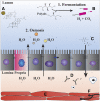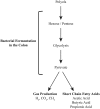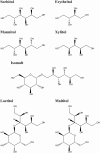A Systematic Review of the Effects of Polyols on Gastrointestinal Health and Irritable Bowel Syndrome
- PMID: 28710145
- PMCID: PMC5508768
- DOI: 10.3945/an.117.015560
A Systematic Review of the Effects of Polyols on Gastrointestinal Health and Irritable Bowel Syndrome
Abstract
Polyols are sugar alcohols found in certain fruits, vegetables, and sugar-free sweeteners. They make up a component of the diet low in fermentable oligosaccharides, disaccharides, monosaccharides, and polyols, which is gaining popularity in the treatment of patients with irritable bowel syndrome (IBS). We conducted a systematic review to evaluate the effects of polyols on the gastrointestinal tract in healthy men and women and in patients with IBS. Utilizing PubMed, Ovid, and Embase databases, we conducted a search on individual polyols and each of these terms: fermentation, absorption, motility, permeability, and gastrointestinal symptoms. Standard protocols for a systematic review were followed. We found a total of 1823 eligible articles, 79 of which were included in the review. Overall, available work has shown that polyol malabsorption generally occurs in a dose-dependent fashion in healthy individuals, and malabsorption increases when polyols are ingested in combination. However, studies in patients with IBS have shown conflicting results pertaining to polyol malabsorption. Polyol ingestion can lead to intestinal dysmotility in patients with IBS. Regarding the microbiome, moderate doses of polyols have been shown to shift the microbiome toward an increase in bifidobacteria in healthy individuals and may therefore be beneficial as prebiotics. However, data are limited regarding polyols and the microbiome in patients with IBS. Polyols can induce dose-dependent symptoms of flatulence, abdominal discomfort, and laxative effects when consumed by both healthy volunteers and patients with IBS. Further research is needed to better understand the effects of specific polyols on gastrointestinal function, sensation, and the microbiome in health and gastrointestinal disorders such as IBS.
Keywords: artificial sweeteners; disaccharides; fermentable oligosaccharides; microbiome; monosaccharides; motility; polyols; sugar alcohols.
© 2017 American Society for Nutrition.
Conflict of interest statement
Author disclosures: AL and WDC, no conflicts of interest.
Figures



References
-
- Lovell RM, Ford AC. Global prevalence of and risk factors for irritable bowel syndrome: a meta-analysis. Clin Gastroenterol Hepatol 2012;10:712–21. - PubMed
-
- Ohman L, Simren M.. Pathogenesis of IBS: role of inflammation, immunity and neuroendocrine interactions. Nat Rev Gastroenterol Hepatol 2010;7:163–73. - PubMed
-
- Collins SM. A role for the gut microbiota in IBS. Nat Rev Gastroenterol Hepatol 2014;11:497–505. - PubMed
-
- Shepherd SJ, Gibson PR. Fructose malabsorption and symptoms of irritable bowel syndrome: guidelines for effective dietary management. J Am Diet Assoc 2006;106:1631–9. - PubMed
Publication types
MeSH terms
Substances
LinkOut - more resources
Full Text Sources
Other Literature Sources

